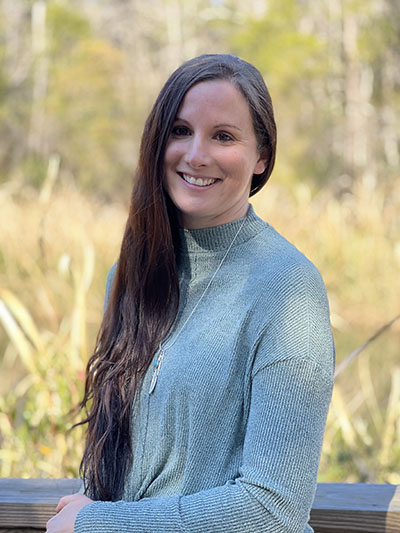Campus News
Danielle Dadiego named recipient of 2022 Society for American Archaeology Dissertation Award
UC Santa Cruz alumna Danielle Dadiego (M.A. Anthropology, ’17; Ph.D. Anthropology, ’20) has worked in the archeology field for nearly two decades. Her dissertation, Beads, Bullets, and Brokerage: Exploring Economic Agency in Eighteenth-Century West Florida, has been nationally recognized by the 2022 Society for American Archaeology Dissertation Award, one of the most prestigious awards in the archeology field.

UC Santa Cruz alumna and Ph.D. recipient Danielle Dadiego (M.A. Anthropology, ’17; Ph.D. Anthropology, ’20) is the winner of the 2022 Society for American Archaeology Dissertation Award, the most prestigious dissertation award in the Archaeology field.
Using all of the tools at her disposal via UCSC’s Anthropology Department and Plasma Analytical lab—cutting-edge technology, mentorship from faculty, grants, and fellowships—Dadiego was able to explore every avenue in her dissertation research.
“Above all, I’m honored,” Dadiego says. “It shows that we (UCSC) have a very rigorous program, one that challenges students to produce quality work.”
Judith Habicht-Mauche, professor emeritus and close mentor of Dadiego’s, says Dadiego’s win emphasizes the caliber of UCSC’s archeological program. She says this honor is usually given to recent Ph.D.s from larger, older, and more established graduate programs around the nation.
“For someone from our small and relatively new program to win this award is truly amazing,” Habicht-Mauche says. “It shows that our graduates can compete nationally with the very best in our discipline.”
In her dissertation, Beads, Bullets, and Brokerage: Exploring Economic Agency in Eighteenth-Century West Florida, Dadiego combined three different methods in historical archaeology to provide evidence of how goods moved through colonial and indigenous communities in 18th century West Florida.
Dadiego used archival research, traditional artifact analysis, chemical composition, and isotopic analysis to examine a collection of sites in Pensacola, Florida, from the 18th century. She focused on illicit trade between and among Native American groups living in colonial Pensacola and between Spanish, British, and French colonists.
“Combining these multiple research approaches and techniques greatly enhanced the richness and multifaceted nature of her historical and anthropological interpretations and made for a highly original and truly outstanding dissertation,” Habicht-Mauche says.
During her time at UC Santa Cruz, Dadiego was awarded several grants to pursue her research, including ARC Graduate Research Grants, Anthropology Department Summer/Winter Travel Grants, Graduate Research Assistantships, and the Graduate Student Association GRAF Research Grant. She was also awarded the Dissertation Improvement Grant from the National Science Foundation in 2019.
The funds she received from those grants helped pay for her trips to Haiti, where she worked on the UNESCO World Heritage Site. They also allowed her to use groundbreaking equipment like Laser Ablation Inductively Coupled Plasma Mass Spectrometry (LA-ICP-MS ) — a resource available to students on campus but expensive to put into use. At UCSC, Dadiego developed protocols for using LA-ICP-MS to chemically characterize and source majolica pottery and glass trade beads from several colonial mission and presidio contexts.
“It would have been impossible without that kind of support,” Dadiego says. “My ambitions of what I wanted to get done were high, and archaeometry itself is very expensive, and so having that avenue and support from the faculty to get these grants made it possible to make my dissertation cutting edge.”
Dadiego’s archaeological pursuits
Dadiego has been in the archaeology field for nearly two decades, has traveled around the world, including Canada, Spain, and Haiti, and received her degrees from universities around the country.
She received her B.A. in Geography-Anthropology with a concentration in Anthropology at the University of Southern Maine in 2007. Her first field school trip was to Canada, where she got to work with the indigenous Cree population on their reservation. She says the collaborative work she got to do there hooked her into archaeology right off the bat.
“Archaeology is rigorous physically, but you’re also experiencing tangible history, and you’re sharing it with other people,” Dadiego says.
She worked in cultural resource management before pursuing her Master’s in Anthropology at the University of West Florida in 2014. During her time at UWF, she traveled to Spain multiple times, where she experienced working in archives and began focusing her work on Spanish colonial archaeology.
Dadiego said when it was time to pursue her Ph.D., UC Santa Cruz was her first choice.
“Being at UCSC and having the labs, the expertise of the faculty, and working with Judith on laser ablation, is something that’s not available or accessible at most universities,” Dadiego says. “The program at UC Santa Cruz allowed me, as a professional, to create a niche that’s not widely filled. I’m extremely grateful for the experience that I had at UC Santa Cruz.”